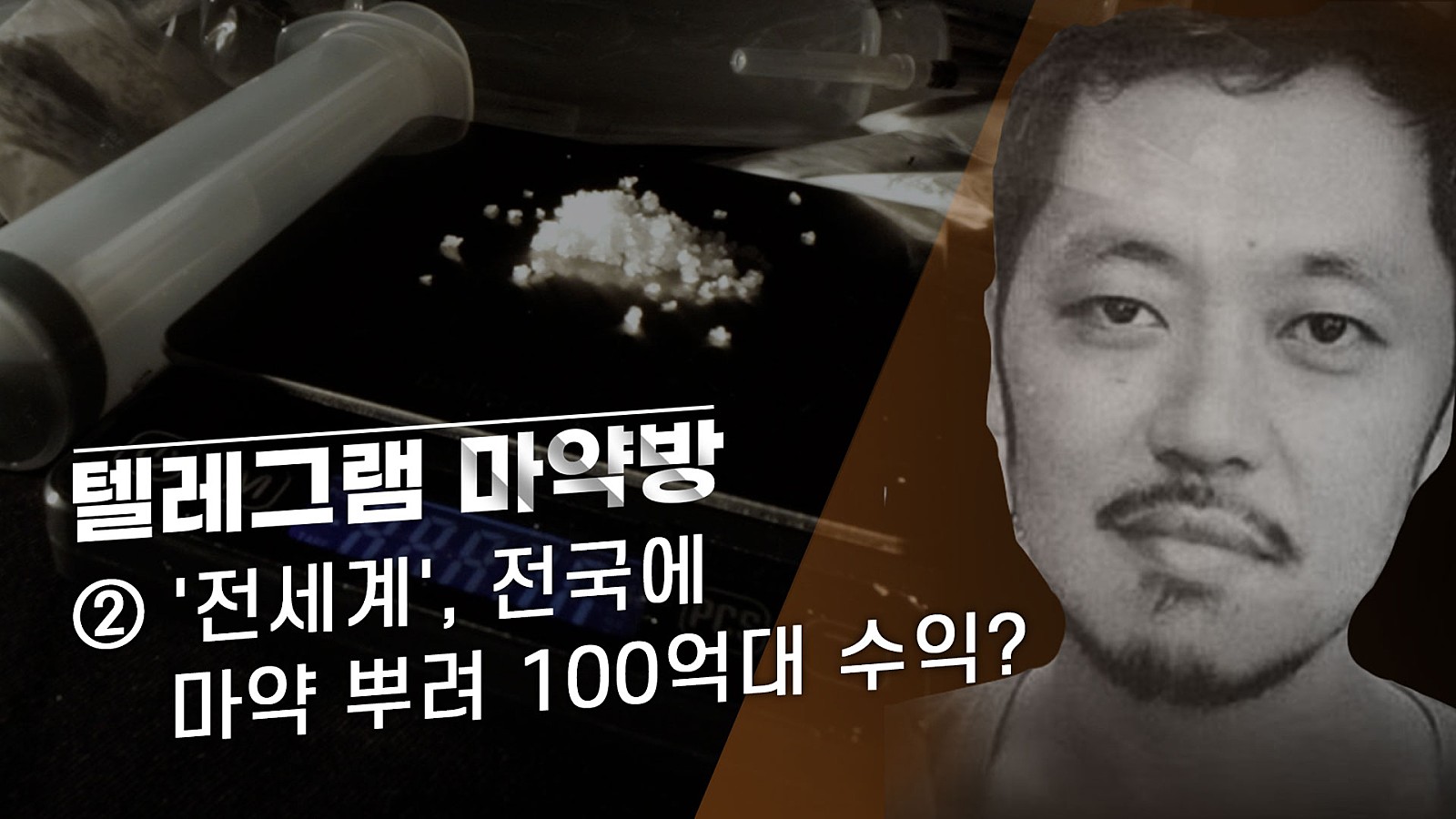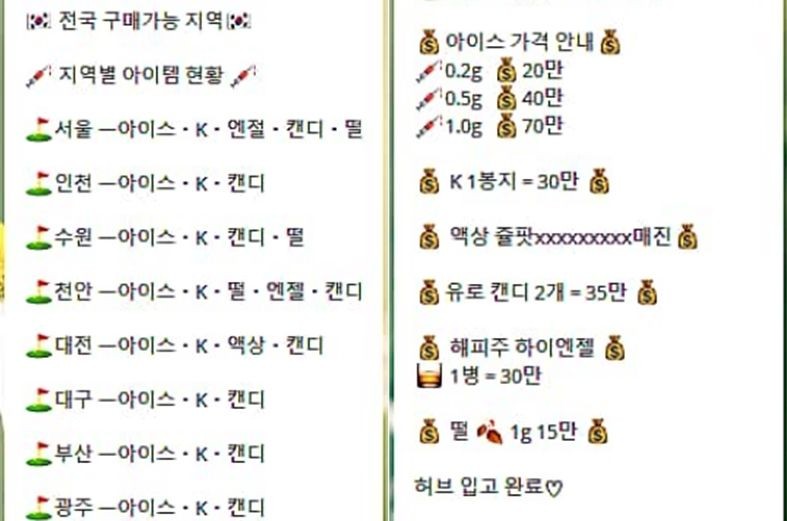Recently, drug sales via social networking apps like Telegram have been on the rise around the world. Telegram is an open source Internet mobile messenger operated by Telegram Messenger LLP. The number of users has increased steadily due to their data encryption practice, providing a high degree of security for users. Sales in illicit drugs on Telegram are also simple and low risk, so more people are signing up for the service. Korea is not immune to this new phenomenon. According to a ‘White Paper on Drug Crimes’ released annually by the Supreme Prosecutors' Office, the number of drug offenders arrested by police has been increasing every year. The figure rose from 9,900 in 2008 to 11,916 in 2015, and 16,044 in 2019. The rise of narcotics chat rooms on Telegram are to blame.
Narcotics Room has been exploited by numerous drug dealers who it as a venue for peddling their drugs. Dozens of drugstores have opened and actively operate on Telegram and thousands of articles on drug use have been posted. Articles explaining how to smoke marijuana or take illicit drugs are constantly being posted. In addition, dealers are recruiting members and part-time workers for drug drops. They even tell them how to avoid police tracking. Indeed, a great deal of crime is in full swing in the blind spots of the law. To purchase drugs on the app, users send a message to the chat and a bot returns a menu of the items available. When a selection is made, the customer pays by crypto-currency transfer and the delivery of drugs is conducted by untact methods. They are simply given the coordinates of a site where the drugs are hidden in outdoor equipment or mailboxes for pick up.
 |
| ▲ The photo of Jeonsegye. (Photo from Newstapa) |
There is a most infamous drug dealer in the Telegram Narcotics Room is 'Drug King, Jeonsegye'. Many drug dealers on Telegram say that Jeonsegye is the number one dealer in the world. They admire him because the National Intelligence Service (NIS) and ICPO (International Criminal Police Organization) are after him. "All the drug dealers I met on Telegram praise Jeonsegye. If someone doesn't know him, he is not a drug dealer,” said one vigilante in Narcotics Room. Drug dealer A, an assistant of Jeonsegye, traded about 18.61g of methamphetamine for about 10 million won. He hid drugs in secret places such as a mailboxes, or on the back of outdoor air conditioning units for pick-up. He estimates overall, Jeonsegye has circulated drugs worth about 30 billion won.
In January, the police began to build a profile of the infamous dealer. According to a police report written in January, ‘Jeonsegye deals primarily in methamphetamines. He manufactures the product in Southeast Asia (Philippines) and smuggles it into Korea. He also sells drugs to many people by recruiting brokers.' On February 6, drug dealer A was interrogated by the police and offered up clues on the whereabouts of Jeonsegye. A met Park Wang-yeol, otherwise known as Jeonsegye, in prison when the drug dealer was serving time for the October 2016 murder of three Koreans in Pampanga, Philippines. Park later broke out of jail and turned his attention to drug dealing quickly building an empire around him. A said, "It won't be easy to arrest him,” a statement Korean police find hard to deny. As in the Nth Room case, Telegram has not responded to requests for assistance in this criminal investigation. The attitude of Telegram makes it difficult for the police to investigate activities taking place in the Narcotics Room. An official from the Cyber Security Bureau of the National Police Agency interviewed by journalist Hong Joo-hwan of Newstapa for a report on the Telegram Narcotics Room case said, "We don't know who to contact at Telegram. Nevertheless, we e-mailed an open e-mail address and asked several times if they could provide information on subscribers suspected of criminal activity, but we never received an answer." Telegram’s assistance is essential in expediting the investigation of criminals, but instead the company is choosing to aid and abet the criminals. The investigation is also facing difficulties as drug dealers on Telegram continue to interfere with the process by spreading information on the identities of the police that are involved in the investigation.
 |
| ▲ Telegram drug distribution status. (Photo from SBS News) |
Another matter complicating the investigation is the fact that the drug trade in the Narcotics Room is taking place at an international level, using foreign cryptocurrency exchanges. In the case of domestic cryptocurrency transactions, fortunately, the Act on Cryptocurrency Exchange was modified, so that transactions will be subject to domestic financial regulations, enabling a faster investigation from March next year. However, the police will still have trouble investigating foreign-based cryptocurrency exchanges. Journalist Hong Joo-hwan also quoted an official from the police agency saying, “While investigating drug cases, if we suspect that money came and went through cryptocurrency exchanges abroad, we send an official letter of cooperation request to the exchange through ICPO (International Criminal Police Organization) and others. If they refuse to cooperate, an investigation that would normally end in a week, can take much longer, as we continue to persuade them.”
The Narcotics Room has brought an end to our idea that the drug trade has to take place face-to-face and punishment for these crimes are now harder than ever. Laws need to be created to address the existing legal inadequacies and measures must be taken to prevent the proliferation of crime via the Narcotics Room. Tougher punishments should be made for crimes using secure messenger services and virtual currency exchanges, because of the massive efforts involved in solving the offenses. Arresting the criminals involved in the Narcotics Room case will motivate such discussions and hopefully bring about the changes we need.
류시은, 김민경, 심민정, 오유준 dankookherald@gmail.com

![[Campus Magnifier] Let's Surf the Library!](/news/photo/202404/12496_1765_4143.jpg) [Campus Magnifier] Let's Surf the Library!
[Campus Magnifier] Let's Surf the Library!
![[Campus Magnifier] Let's Surf the Library!](/news/thumbnail/202404/12496_1765_4143_v150.jpg)





